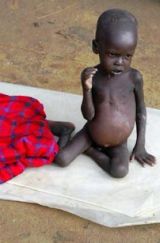ANALYSIS – Dying children expose broken promise to south Sudan
By Matthew Green
MARIAL, Sudan, May 27 (Reuters) – The sunken eyes and emaciated limbs of children starving in southern Sudan show that Western governments risk breaking promises of massive aid to cement an end to decades of civil war.

|
|
A severely malnourished Sudanese child sits on the ground inside a hospital run by medical charity Medecins Sans Frontieres in the town of Marial Lou, northwest of the southern town of Rumbek, May 26, 2005. (Reuters). |
Faced with competing calls to finance help for a separate conflict in Sudan’s western Darfur region, donors are failing to send the food needed to avert south Sudan’s worst crisis since a 1998 famine in which at least 60,000 people died.
Aid workers fear growing hunger will enflame localised conflicts over water and cattle that could complicate the most delicate stage of attempts by former rebels to implement their January peace deal with the Khartoum government.
“After all the push that there’s been for the peace process one would expect that there would have been a lot of support for Sudan,” said Laura Melo, spokeswoman for the U.N. World Food Programme based in the Kenyan capital Nairobi.
“We’re really extremely concerned that if we don’t answer to the needs of the population there could be a very serious impact on stability,” she said.
The lack of help for southern Sudan reveals a growing gap between rhetoric and reality as the Group of Eight industrial nations prepare for summit at Gleneagles in Scotland in July, where fighting Africa’s poverty will be high on the agenda.
British Prime Minister Tony Blair aims to convince fellow G8 members to double aid to the continent as part of a rescue plan he unveiled this year, but hunger in southern Sudan shows how often pledges of cash fail to produce help when it is needed.
Donors promised $4.5 billion to bolster the peace deal at a conference in Oslo in April, but warehouses at the Kenyan border town of Lokichoggio used as a staging post for aid dropped by U.N. cargo planes are almost empty.
Relief agencies worry that calls for help in the south may be drowned out by appeals for the Darfur conflict, which erupted in 2003 when rebels began fighting the government over similar concerns about marginalisation voiced by the southern rebels.
U.N. Secretary-General Kofi Annan urged donors on Thursday to come up with $466 million requested by the African Union to triple its peace force in Darfur, warning rich nations they would otherwise have to finance an “epic relief effort”.
MEALS OF GRASS
Teetering between survival and starvation, women in the Sudan’s southern Bahr el Ghazal region are boiling leaves and grass to feed their children after raiders from hostile tribes stole their cows to feed their own desperate families.
“Our husbands don’t have enough energy to fight,” said Aluong Mawien, 35, who trekked to a feeding centre set up by relief workers in a mud village outside town the town of Marial. “I can’t feed my baby, there’s no milk in my breasts.”
The few aid workers in the region, one of the poorest places on earth, say that unless food starts arriving soon, large numbers of people will die — starting with the children.
“Governments and private individuals have worked very hard over the last 22 years to establish some kind of peace accord — it’s happened,” said Patrick Murphy, medical coordinator at a bush hospital in Marial run by Medecins Sans Frontieres.
“One of the ways to support that is to make sure that the people here don’t starve to death,” he said, speaking in a ward where dozens of mothers and babies lay on mats, recovering after weeks of foraging for nuts and leaves in the wilderness.
DRY AS DUST
Warning bells rang last year when rains started late and finished early, but the U.N. food agency says it has only received about 25 percent of a $302 million appeal for southern and eastern Sudan to feed more than 3 million people.
Downpours will soon turn tracks into mud when the rainy season starts, prompting concerns among aid agencies that it will soon be too late to bring the necessary supplies by truck.
The World Food Programme says the lack of funds reflect worldwide shortfalls in food aid this year — a sharp contrast to the big pledges for the Asian Tsunami — but the lack of help for south Sudan in particular has come at a critical time.
Hundreds of thousands of refugees who fled to northern Sudan or to Uganda and Kenya are hoping to return now the rebel Sudan People’s Liberation Army has struck its power-sharing deal with Khartoum, but they may find only plots full of shrivelled crops.
In the long run, millions of people in southern Sudan will have scant hope of escaping decades of dependence on outsiders without the grain and seeds needed to plant their next harvest.
“If the aid agencies give us food then we’ll be able to feed ourselves,” said Alwal Aluak, 24, waiting under a tree for help for her child. “If there’s no food aid, people will die.”
